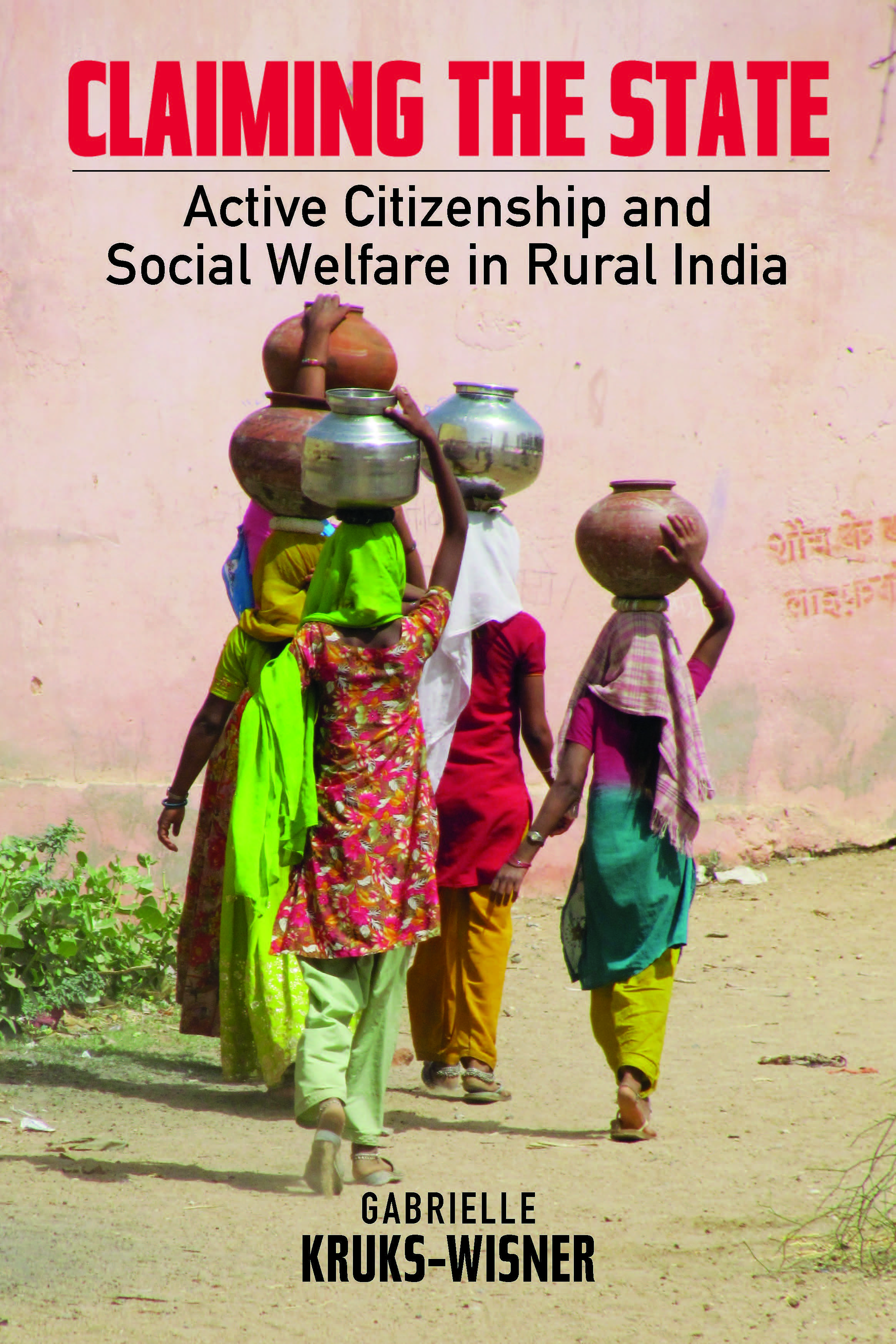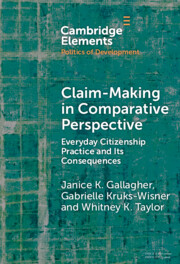Books | Articles & chapters | Work in progress

My research is focused on local citizen-state relations and their consequences for human and social welfare. My work is motivated by two basic questions. How can governments – and local officials in particular – be held more accountable, to better respond to and serve the needs of citizens? And how can citizens actively and effectively engage and make demands on the state, between and beyond elections?
Books
Claiming the State: Active Citizenship and Social Welfare in Rural India. Cambridge University Press. 2018.
Awarded the 2018 Joseph W. Elder Prize by the American Institute for Indian Studies for the “best first book in the Indian social sciences.”
 Citizens around the world look to the state for social welfare provision, but often struggle to access essential services in health, education, and social security. This book investigates the everyday practices through which citizens of the world's largest democracy make claims on the state, asking whether, how, and why they engage public officials in the pursuit of social welfare. Drawing on extensive fieldwork in rural India, Kruks-Wisner demonstrates that claim-making is possible in settings (poor and remote) and among people (the lower classes and castes) where much democratic theory would be unlikely to predict it. Examining the conditions that foster and inhibit citizen action, she finds that greater social and spatial exposure - made possible when individuals traverse boundaries of caste, neighborhood, or village - builds citizens' political knowledge, expectations, and linkages to the state, and is associated with higher levels and broader repertoires of claim-making.
Citizens around the world look to the state for social welfare provision, but often struggle to access essential services in health, education, and social security. This book investigates the everyday practices through which citizens of the world's largest democracy make claims on the state, asking whether, how, and why they engage public officials in the pursuit of social welfare. Drawing on extensive fieldwork in rural India, Kruks-Wisner demonstrates that claim-making is possible in settings (poor and remote) and among people (the lower classes and castes) where much democratic theory would be unlikely to predict it. Examining the conditions that foster and inhibit citizen action, she finds that greater social and spatial exposure - made possible when individuals traverse boundaries of caste, neighborhood, or village - builds citizens' political knowledge, expectations, and linkages to the state, and is associated with higher levels and broader repertoires of claim-making.
- Order here: CUP | Amazon | Amazon India | Bookshop
- Table of Contents
- Book launch (Video), Carnegie Endowment for International Peace
- Featured in: India Ink, Grand Tamasha, Rocking Our Priors, Slice of MIT, India in Transition
- Reviews: Economic & Political Weekly, Commonwealth & Comparative Politics, Pacific Affairs, Asian Studies.
Claim-making in Comparative Perspective: Everyday Citizenship Practice and its Consequences (with Janice Gallagher and Whitney Taylor). Cambridge Elements in the Politics of Development, 2024.
 Claim-making – the everyday strategies through which citizens pursue rights fulfilment – is often overlooked in studies of political behavior, which tend to focus on highly visible, pivotal moments: elections, mass protests, high court decisions, legislative decisions. But what of the politics of the everyday? This Element takes up this question, drawing together research from Colombia, South Africa, India, and Mexico. The authors argue that claim-making is a distinct form of citizenship practice characterized by its everyday nature, which is neither fully programmatic nor clientelistic; and which is prevalent in settings marked by gaps between the state's de jure commitments to rights and their de facto realization. Under these conditions, claim making is both meaningful (there are rights to be secured) and necessary (fulfillment is far from guaranteed). Claim-making of this kind is of critical consequence, both materially and politically, with the potential to shape how citizens engage (or disengage) the state.
Claim-making – the everyday strategies through which citizens pursue rights fulfilment – is often overlooked in studies of political behavior, which tend to focus on highly visible, pivotal moments: elections, mass protests, high court decisions, legislative decisions. But what of the politics of the everyday? This Element takes up this question, drawing together research from Colombia, South Africa, India, and Mexico. The authors argue that claim-making is a distinct form of citizenship practice characterized by its everyday nature, which is neither fully programmatic nor clientelistic; and which is prevalent in settings marked by gaps between the state's de jure commitments to rights and their de facto realization. Under these conditions, claim making is both meaningful (there are rights to be secured) and necessary (fulfillment is far from guaranteed). Claim-making of this kind is of critical consequence, both materially and politically, with the potential to shape how citizens engage (or disengage) the state.
- Order here: CUP | Amazon | Bookshop
- Video Abstract
- Featured in: Governance Uncovered.
Manuscript in progress
Pandemic Inequality: Citizens, States, and Covid-19 in India (Ed., with Poulami Roychowdhury). Under contract, Oxford University Press.
Articles and chapters
“Institutional Recognition: Activating Representation to Build Police Responsiveness” (with Akshay Mangla and Sandip Sukhtankar). American Political Science Review, published online August, 2025.
[Pre-publication accepted version | Appendix]
- Winner: APSA-PSA International Partnership Award, 2025.
“Social Brokerage: Accountability and the Social Life of Information.” Comparative Political Studies, 55(14), 2022.
[Pre-publication accepted version]
- Featured in MIT GOV/LAB news.
“Policing in patriarchy: An experimental evaluation of reforms to improve police responsiveness to women in India" (with Sandip Sukhtankar and Akshay Mangla). Science, 377 (6602), 2022.
- Winner: APSA-PSA International Partnership Award, 2025.
- Winner: Best Academic Research with Societal Impact Award, Financial Times, 2024.
- Featured in Hindustan Times (op-ed), Nature News, The Print, J-PAL, VoxDev.
Great Expectations, Great Grievances: The Politics of Citizen Complaints in India. Comparative Politics, 54(1), 2021.
- Featured in Governance Uncovered.
"State–Society Synergy at COVID-19’s Invisible Front Lines," with Dyuti Saunik, Avani Kapur, & Jessica Mayberry. Economic & Political Weekly (Engage), 56(32), 2021.
"The Geography of Citizenship Practice: How the Poor Engage the State in Rural and Urban India," with Adam Auerbach. Perspectives on Politics, 18(4), 2020.
- Featured in Ideas for India, ThePrint.
"The Pursuit of Social Welfare: Citizen Claim-Making in Rural India." World Politics, 70(1): 122-163 (2018). (Corrigendum.)
- Awarded the 2019 Luebbert Article Prize by the Comparative Politics section of the American Political Science Association for the “best article in comparative politics in the past two years”)
"Seeking the Local State: Gender, Caste, and the Pursuit of Public Services in Post-Tsunami India." World Development, 39(7): 1143-1154 (2011).
"Promoting Sustainability, Building Networks: A Green Entrepreneur in Mexico." In M. Shaper (Ed.), Making Ecopreneurs: Developing Sustainable Entrepreneurship. Routledge (2010).
Work in progress
“Democratizing Democracy: Can citizens demand accountability from unelected officials?” (with Tanu Kumar). (Revise & Resubmit).
- Winner: Best paper, Class and Inequality, APSA 2025.
“COVID-19 in the Village: Citizens, States, and Hybrid Local Actors ” (with Avani Kapur and Dyuti Saunik). (Under review).
“(Un)Willing Partners? Citizen-bureaucrat collaboration in capacity-constrained settings” (with Tanu Kumar, Dyuti Saunik, Basim Nissa, and Manish Ranjan). (Working paper).
“Anatomy of Reform: Organizational Change, Persistence, and the Scaling of Gender-Targeted Reform in India’s Policing Sector” (with Akshay Mangla & Sandip Sukhtankar). (Draft in progress).
“Building an Inclusive Workforce: Interventions to Empower Female Police Officers in India” (with Arielle Bernhardt, Akshay Mangla, and Sandip Sukhtankar). (Draft in progress).
"Citizen Journalism in the Digital Age: Trust, Action, and Local Problem-Solving" (with Bhumi Purohit, Tanu Kumar, and Jessica Mayberry). (Research in progress).